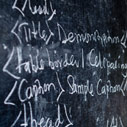As many readers may be unaware, I am still a student this year. After finishing the postgrad diploma in journalism at Rhodes University last year, I remained to pursue an MA in Media Studies through a part coursework/part dissertation program. The dissertation is meant to start in the third quarter of this year, but I have been beavering away to try and get a proposal finished in the next month or two so that I can get started early. I think I can work harder and finish faster. So it’s at least worth trying to, and seeing how I go.
Broadly – and this may yet change, depending on what I learn in the next month – I want to look at instances of reporting on the Darfur conflict in mainstream, largely western, media. I want to examine the extent to which this has characterised the fighting as ‘genocide’ in a manner that is inconsistent with the legal definition of the term used at the International Criminal Court. My suspicion is that the media gets it wrong, and that it creates a public expectation to prosecute that can place undue pressure on the development of international law on genocide, making the scope of the crime unduly broad. For now, though, I am still trying to get enough superficial information together to determine whether there is something to investigate here.
Truth be told, I have been reading a lot about genocide lately.
Which was partly why I had met with my lecturer earlier this week. Lacking an actual supervisor, Prof. Lynette Steenveld has been unbelievably accommodating of my drafts and questions as I get the hang of what is required. She has been pushing me to find the holes I need to plug to argue that there is something to research here, and making sure – I suspect – that this is something I really want to research. On Tuesday, after going through some of the preliminary notes I had written and recommending a couple of useful readings, she asked me why I wanted to research this issue in particular. It’s unusual, given that many MA students seem to choose more prosaic and easily handled local issues to focus on. I think I mumbled something about being drawn to the areas that are at risk of falling off the map of what the world sees and cares about, or which have already done so. I suspect that is actually the tip of a very large iceberg.
Truth be told, I have been reading a lot about genocide lately. A bit about the LRA, a great deal about Rwanda, and a mix of international law on genocide and the tribunals for crimes committed in the conflicts in Rwanda and the former Yugoslavia. Some of it I have been reading late at night. Then remembering some of the stories from Uganda. Then not sleeping very well. Yet I’ve been keeping at it – propelled by some energy not normally available to me. Part of that is a promise made to myself earlier this year when traveling from Oxford in the night. Part of it is something else that I can’t quite put my foot on.
I almost caught myself trying to explain to Prof. Steenveld that it’s as if I want – as if I need – to keep focused on places that are a mess. On ignored conflicts. I know people who compulsively avoid facing painful information. I am not one of those. Nor am I someone who insists on feeling perpetually depressed about the state of the world – those who know me will probably put me in the most boisterous fifth of any given room. And yet I feel unfulfilled without keeping a part of my time aside to learn about the places in the world that are, in some sense, dark.
Maybe it’s out of a feeling of wanting to use my relative privilege in the world to make bad things stop. Maybe studying genocide and listening through interview recordings from Gulu offers a chance to make a tiny difference against something that should be unambiguouslyy resisted. Perhaps it’s just a way of keeping the world in perspective. Or maybe I really have no idea why my emotional impulses are the way they are.
Which is why it’s so hard to explain when someone asks, why I would keep on foot in the darkness.
In truth, I’ve no idea. But I want to do so anyway.

